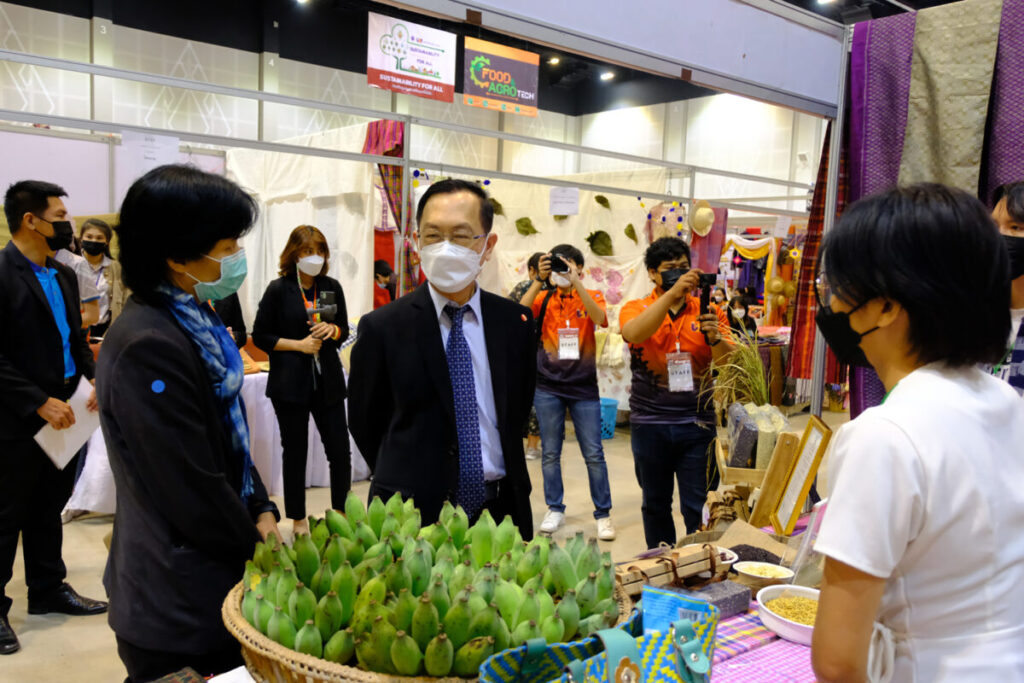
Khon Kaen University (KKU), in the northeast of Thailand, aims to develop manpower and create knowledge to develop the northeastern region, which has a large area affected by drought, where as many as one-third of poor Thai people live and face inequality problems in many areas. It is intended that the people of the region will have more opportunities to access higher education, have a better standard of living and quality of life according to the policy of the extension of higher education in the region.
Khon Kaen University acts in reducing poverty and solving fundamental problems of the people in the northeast by mobilizing personnel and students from 19 faculties or departments in the university in bringing knowledge, technology, research results and innovations to help solve the problems of the community and society, to help raise a stable and sustainable economy by employing more than 600 people in the area, over 1,500 graduates, including, more than 1,000 students, making employment with a circular economy in the communities and sub-districts. Livelihoods have been created to generate income, as well as new entrepreneurs, known as Start Ups in the community or in that locality by using the resources that are available locally. The university's research and innovation knowledge is used to help increase the value of products as well as the emergence of community enterprises for businesses within the community which have support from the private sector and local government in the integration of work for the stability and sustainability of the community economy. This could involve an industrial company, industry council, Chamber of Commerce, banks, community leaders, local leaders, Sub-district Administrative Organizations (SAO), Provincial Administrative Organizations (PAO), sheriffs, and Provincial Governors for the poverty alleviation projects such as the sub-district university projects or the University to community projects.
In addition, there are projects to promote the basic economy or poverty alleviation projects which have been operating from the past to the present by bringing the knowledge, research, technology and innovations of the University to the community to practice and gradually expand from the area called KKU Pattana District Area around the university to all provinces in the northeast region and other regions of the country. The important projects are (1) the project to promote the raising of native chickens. Black-tailed Pradu and KKU1 chickens being bred to make them strong, fast growing and with less fat. Chicks are produced in the university and encouraged by farmers to raise them to produce and sell or pass them on to the market. It is an upgrade of the native chicken breed with high quality and high market prices. This allows the local people to earn more income from raising and selling them. (2) The project to produce safe vegetables to increase the value of vegetables that are sold in the general market by reducing the use of chemicals as much as possible for the safety of consumers, resulting in higher prices and an alternative to vegetable cultivation as it is in the present (3) The agricultural organic project is a project that focuses on the use of natural materials, whether it is biological substances or various organic fertilizers used in the cultivation of vegetables. Various agricultural products that are uncontaminated by chemicals are currently in demand in the market. Khon Kaen University has promoted and supported the development of various skills training projects for farmers to be able to meet organic or safe agriculture standards. (4) The Insect Protein Project; the university is promoting feeding crickets and striped flies starting from cultivating breed selection Greenhouse making, processing and market grouping together to form and strengthen community enterprises. There was a turnover of business in the community. For striped flies cultivation is encouraged, as there are products that are sold as larvae and pupa. The leftovers are used to make fertilizer to reduce the cost of purchasing animal feed, especially in raising fish, raising chickens and pigs, etc, reducing costs in feed, concentrated food, which mainly comes from fish meal. The cost of raising fish, chickens, and pigs is quite high, so bringing striped fly worms to replace the protein feed will reduce the production cost of fish, chicken, pigs, etc., making significantly better income. At the present, in the graduate's employment program, there has been a start-up from cultivating striped flies to selling caterpillars. They are used as food for animals and the leftovers from farming are sold as fertilizer (5). Another important project is the processing of agricultural products. The large amount of agricultural products in the same season, results in the price of produce being depressed, so the university introduced food processing technology to add value. It is very beneficial for increasing the value of agricultural products and reducing agricultural waste. Products that already exist in the community are promoted and the strengths and selling points, such as product design and the identity of the area are emphasized through silk patterns, cotton patterns, and bag patterns and designs.
Policy and operation
KKU has a policy and system to support students from poor families. We provide many types of supports such as full support, some financial support, reducing or exempting fees, or even application fees. The fund is supported by 1300 university scholarships, 6 Din Din Daeng funds, 100 alumni associations, 457 funding from internal departments, 1220 funding from external agencies, 1220 scholarships from outside organizations, and 510 scholarships from faculties.
KKU has various forms of support for poor students, such as scholarships, external funding sources, government funds, supporting extra income while studying, reducing tuition fees, and educational loan funds, etc.



